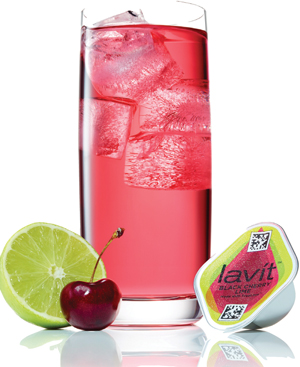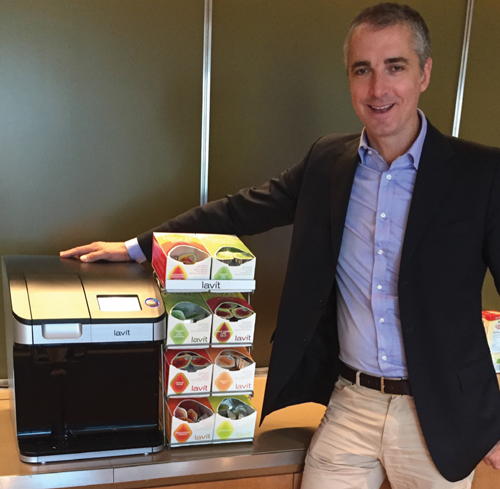News
Lavits Single-Cup Solution Countertop Cold Drinks At Long Last?
November 26, 2015 | Elliot Maras
TAGS: Elliot Maras, Lavit, vending, countertop cold drink dispenser, G.M. Lo Faro, office coffee service, office coffee service, single-serve cold drinks, high-quality cold drinks, recyclable single-cup drink cartridges, RTDs, custom drinks, gourmet drinks, workplace drink system |
 Necessity, according to the proverb, is the mother of invention. No industry has taken this dictum to heart like refreshment services, from the gum merchandisers of the 1880s to the liquid-coffee machines of the 1950s to today's micromarkets. Despite the best efforts of many innovative entrepreneurs, however, one challenge has remained unfulfilled: a countertop dispenser that provides reliable, satisfying, self-served cold beverages. Such a system, simple as it may sound to the unschooled observer, has proven too formidable.
Necessity, according to the proverb, is the mother of invention. No industry has taken this dictum to heart like refreshment services, from the gum merchandisers of the 1880s to the liquid-coffee machines of the 1950s to today's micromarkets. Despite the best efforts of many innovative entrepreneurs, however, one challenge has remained unfulfilled: a countertop dispenser that provides reliable, satisfying, self-served cold beverages. Such a system, simple as it may sound to the unschooled observer, has proven too formidable.
Today, American worksites stand in the midst of change. Consumers have a taste for high-quality beverages. They are technology-savvy and they want to be constantly entertained. They are health conscious. They are environmentally aware, and they want services that allow them to support a sustainable planet.
It is in this daunting set of circumstances that the Lavit countertop water and beverage dispenser rises to the call. An aesthetically pleasing, easy-to-use, compact unit, Lavit offers drinks that meet today's diverse tastes. Designed to meet its calling, Lavit takes its name from the European words, "vita" (life), "vit" (vitamin) and "vite" (speed).
But will New York City-based Lavit really do for cold beverages what the single-serve cartridge has done for hot drinks? First, some history is in order.
A Newcomer To The Scene
G.M. Lo Faro, founder of Lavit, noticed in 2009 that while there were many water coolers in the U.S., none of them delivered anything other than still water. Beverage manufacturers had perfected the quality of RTDs and they were offering more variety than ever, but no readily available dispenser would produce cold water at the touch of a button and delicious beverages of consistent high quality.
He also saw the beverage market becoming more health-oriented. Consumers were increasingly moving away from products with artificial flavors and preservatives. He noticed that even the big soda companies had diversified into more natural beverages. "The workplace is transforming into a place of wellness," he said. "Wellness is really top of mind today."
He further noticed consumers were seeking out products that were environmentally sustainable and socially responsible. Even the biggest beverage companies were investing in sustainability initiatives and social justice projects. In the coffee industry, "fair trade" was a growing movement that embraced both of these directions.
Lo Faro couldn't help but wonder why self-prepared cold beverages were not widely available like hot ones, and he was certainly not the only person asking this question. But, being a refreshment services industry outsider, Lo Faro didn't already know the answer; the establishment answer being that it was not economically feasible for a system to deliver the necessary beverage quality in a reliable and sanitary manner.
Lo Faro, an accomplished real estate entrepreneur with a background in technology, may have been naive about some aspects of refreshment services in 2009, but he couldn't help but believe timing was ripe for a system that would allow consumers to prepare their favorite beverages at work. So he began researching cold beverage preparation and dispensing technology.
The Time Was Right
 |
IT'S RIGHT!:Lavit founder G.M. Lo Faro knows what's involved in creating a cost-effective and eco-friendly machine that can craft pure water and carbonated beverages. After six years of research and development, Lavit is launching its single-cup cold drink machine this fall. The countertop dispenser measures 17.5" H. x 14" W. x 19" D. and weighs 42 lbs. (empty). The user inserts an all-aluminum Lavit capsule into the dispenser and touches a button to prepare a 12-fl.oz. chilled beverage. |
He realized technology had improved the capability of point-of-use water coolers and water quality. However, this only begged the question: Why did this capability not extend to sodas, flavored beverages and teas? Which, after all, are water-based...
SodaStream had revolutionized the home beverage market by allowing consumers to prepare their own favorite drinks at the push of a button. Still, in the office, other than sparkling water, there was no way for consumers to serve themselves the cold beverages they wanted one cup at a time.
"We thought there was a need for a machine that delivers great quality water and also makes delicious beverages out of great quality water," he recalled.
Lo Faro also thought that while water quality had come a long way, thanks to advances in filtration and dispensing technology, the workplace water cooler was ready for a high-tech makeover. "You mainly get still water out of your average water cooler. There was an opportunity to make the water cooler more fun, to make it more interactive, to bring new design ideas."
If there was a way to make the water cooler more exciting and allow customers to prepare their own beverages, he was convinced such a system would improve people's attitudes about going to work.
"We wanted to give people a vast array of beverage options at work," he said.
Research Begins
Lo Faro's research took him to the National Automatic Merchandising Association's OneShow and the Water Quality Association's trade show. The more he studied the refreshment services market, the more he realized the task wasn't going to be easy.
Was it possible to provide a worksite solution that delivers quality, variety, sustainability and a socially conscious experience at an affordable cost for the service provider?
Lo Faro was game. As big as the challenge was, he decided that the time was right for a solution. Cartridge-based, single-serve technology had come a long way, and it had to be possible to allow people at work to get the beverage quality and variety they were buying at the supermarket.
He lined up some investors, and a year and a half later, he assembled a team of scientists and engineers.
Beverages made with concentrate were intrinsically more stable than premixed beverages. Hence, it was possible to develop all-natural concentrates that could mix with water at the point of consumption.
The single-serve coffee market had already developed capsules that could package natural concentrate. The capsules also made it possible for a dispenser to serve a variety of different beverages without risking cross contamination.
The concentrate, besides being all natural, delivers a longer shelf life than RTD beverages. Besides offering an efficient way to provide a natural beverage, an aluminum capsule, like Lavit uses, enables extended shelf life that makes inventorying less expensive throughout the product's supply chain and facilitates a market-sustainable price point.
Best of all, the intrinsically stable nature of the powder meant that no preservatives would be necessary to stabilize the ingredients. And the aluminum capsule and dry powder combination could enable a shelf life of up to two years, naturally, with no preservatives. The capsule also simplified cleaning the dispenser and keeping the beverage service cabinet neat and organized.
Lo Faro's research culminated in a study that took into account all of the needs noted above and weighed the model the team developed against a cost/benefit analysis. Lavit was born.
Lavit Debuts
An interactive touchscreen allows the user to decide which beverage to prepare. "We craft still or sparkling beverages on site," Lo Faro says. "It does everything a water cooler does in the same footprint, but also gives beverage options." The system debuts with 20 tasty, thirst-quenching flavors, such as raspberry lemonade, green tea with ginseng, black cherry lime, orange mango and spicy ginger ale.
The water feeds into the dispenser in three ways: from a five-gallon spring water bottle; plumbed into an existing water line (Lavit recommends distributors use a certified NSF 42 and 53 approved carbon block filter to eliminate all foreign taste, odor, chlorine, lead and cysts); or from another water cooler. A built-in carbon dioxide cartridge carbonates beverages.
The machine is made with antimicrobial plastics and an innovative SIP ozone disinfection system. Ozonation cycles through the machine once daily (usually in middle of the night) and prevents microbial growth in waterways and tanks.
Preparation takes between 20 to 30 seconds for a 12-fl.oz. serving. The user manually removes the 2g. Lavit aluminum capsule that is fully recyclable and can be disposed of directly into recycling containers, along with aluminum cans.
As for social responsibility, Lavit supports water charities and donates a portion of capsule sales to clean drinking water projects, helping to provide a clean glass of drinking water to those in need.
Six years might seem like a long time to bring a refreshment services concept to market, but those who are familiar with the extent of the challenge might be impressed by the company's progress. "There's a great deal involved in creating a machine that can craft pure water, carbonated water and beverages with a system that's cost-effective," Lo Faro said. "Getting the technology right was a lot of work."
Positive Reception
Lavit is encouraged by the responses from this year's NAMA and WQA trade shows, where the cold drink dispenser was officially introduced to the refreshment services industry. The company sees the OCS and POU water industries as the best partners to establish Lavit. "Out of our unit, a dealer can have a much more profitable installation than a water cooler alone," Lo Faro said.
The company has no plans to offer exclusive territories to distributors. As distribution expands, Lo Faro envisions working through wholesale distributors. Lavit was built with the help of NAMA and WQA members, and is committed to supporting its commercial distribution partners to ensure their long-term successes with the Lavit platform.
For Lo Faro, the most exciting opportunity is the chance to meet a need that has long gone unmet in refreshment services. While worksite beverages are the industry's foundation, the countertop, self-serve cold beverage dispenser has befuddled the industry due to the complexities entailed. This much became evident in 2010 when Coca Cola Co. pulled the plug on its Breakmate, another countertop cold drink system.
If a new technology can, in fact, deliver cold beverages in a convenient, safe, cost-efficient way, some serious growth could be in store for the worksite refreshment services industry.
"We seek to become the leader in the single-serve cold beverage space by offering the best on-demand options possible in the workplace," Lavit's founder said. "I think we're well positioned."
Long term, Lavit plans to introduce a home unit.
 Elliot Maras has reported on the vending and payments industries for trade publications and business news websites for more than two decades. He was the longtime editor of Automatic Merchandiser until 2012. Maras is a graduate of NAMA's Executive Development Program at Michigan State University, former board member of the International Foodservice Editorial Council and recipient of the Office Refreshment Development Foundation's Award for Journalism. Maras, who lives in Cleveland, is now managing editor of Food Logistics, which covers the food supply chain.
Elliot Maras has reported on the vending and payments industries for trade publications and business news websites for more than two decades. He was the longtime editor of Automatic Merchandiser until 2012. Maras is a graduate of NAMA's Executive Development Program at Michigan State University, former board member of the International Foodservice Editorial Council and recipient of the Office Refreshment Development Foundation's Award for Journalism. Maras, who lives in Cleveland, is now managing editor of Food Logistics, which covers the food supply chain.

